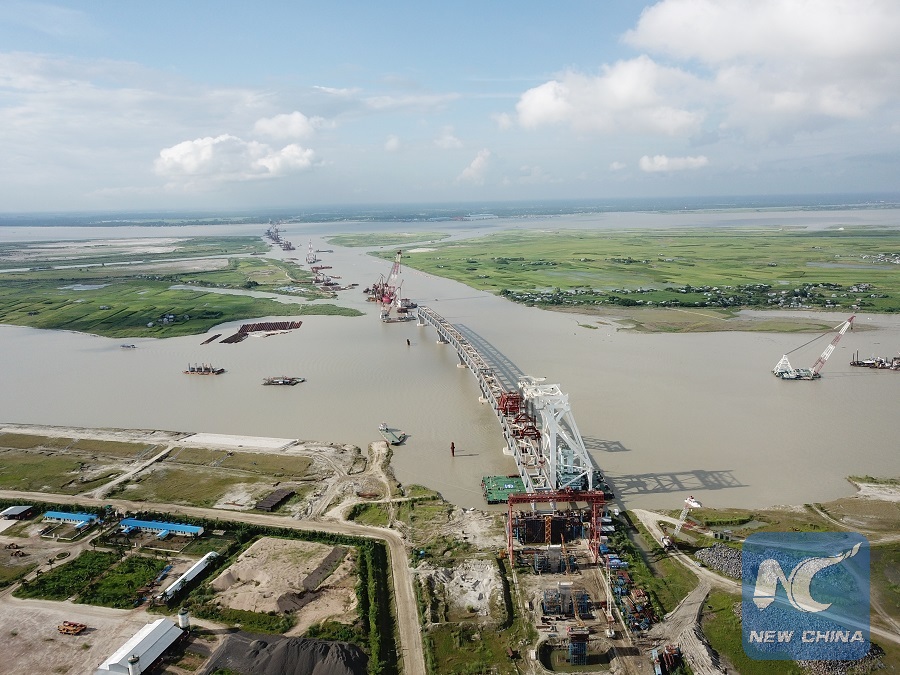
Photo taken on June 29, 2018 shows the construction site of the fifth span of the Padma Bridge on the outskirts of Dhaka, capital of Bangladesh. (Xinhua)
by Naim-Ul-Karim
DHAKA, Sept. 17 (Xinhua) -- China's Belt and Road Initiative that envisions a great win-win connectivity between multiple countries is bringing plenty of opportunities to the world, a Bangladeshi expert told Xinhua in an interview.
Faiz Sobhan, senior research director at the Bangladesh Enterprise Institute (BEI), a leading Bangladeshi think-tank, made the remarks on the occasion of the fifth anniversary of the creation of the Belt and Road Initiative that Chinese President Xi Jinping in the fall of 2013 first proposed while visiting Kazakhstan and Indonesia.
Xi's idea is more than just an infrastructure plan, Sobhan said, it is a comprehensive strategy that also focuses on creating a shared future in a fractured world.
"Today we live in highly globalized world and as such global connectivity has become quintessential if any country wishes to increase their economic and social indicators by developing stronger ties beyond their national boundaries," said Sobhan, who has over two decades of experience on a wide range of international political, economic, social and security issues.
Sobhan, who spent 13 years at the Commonwealth Secretariat in London prior to joining BEI, said China has always been known to be a very forward-looking nation and, has thus embarked on the Belt and Road Initiative.
Sobhan praised the remarkable progress China has made in the past decades.
"China has made remarkable strides in the economic sphere during the past two decades in particular," said the expert, who studied at the University of London and George Mason University in the United States.
He said China's leadership has maintained a visionary outlook and continued on the path of economic and social development both at home and abroad.
"The Belt and Road Initiative is, in that same vein, a grand vision China has had for helping to open up the world," said the expert, whose research includes issues related to regional cooperation, security, radicalization, terrorism, counter-terrorism, preventing and countering violent extremism.
"It is a unique and monumental project with the hope that all the countries connected to it, should openly embrace it."
South Asian countries, such as Bangladesh, over the past two decades have made tremendous economic and social strides, said the senior BEI research director.
Yet the countries in the region are still suffering from a massive infrastructure deficit, thus they now have ample opportunities to use the Belt and Road Initiative as a vehicle to strengthen regional connectivity, he said.
In particular, Bangladesh which is a geo-strategically located nation and is considered a bridge to South and Southeast Asian countries, can avail the opportunity, said Sobhan.
It is good that from the beginning of the Belt and Road Initiative, Bangladesh has expressed an interest in being a part of this grand project, as it was well aware of that it can only stand to benefit, the professor said.
In the area of infrastructure development, Bangladesh has made remarkable gains in recent years thanks to China for its all-out support.
"Work on a number of mega-projects, such as the Padma Bridge, supported by China, is progressing well and Bangladesh aims to continue developing its infrastructure," Sobhan said, adding that Bangladesh is well aware that the foundation of any strong economy is to have excellent infrastructure in place to foster economic growth and development.
"For this reason, Bangladesh is suitably placed to be an important Belt and Road Initiative player in the years to follow," said the expert.

